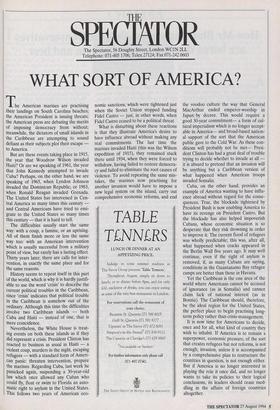SPECTAT THE OR The Spectator, 56 Doughty Street, London WC1N 2LL
Telephone: 071-405 1706; Telex 27124; Fax 071-242 0603
WHAT SORT OF AMERICA?
The American marines are practising their landings on South Carolina beaches; the American President is issuing threats; the American press are debating the merits of imposing democracy from without; meanwhile, the dictators of small islands in the Caribbean are attempting to sound defiant as their subjects plot their escape to America.
But are these events taking place in 1915, the year that Woodrow Wilson invaded Haiti? Or are we speaking of 1961, the year that John Kennedy attempted to invade Cuba? Perhaps, on the other hand, we are speaking of 1965, when Lyndon Johnson invaded the Dominican Republic, or 1983, when Ronald Reagan invaded Grenada. The United States has intervened in Cen- tral America so many times this century and Central Americans have tried to emi- grate to the United States so many times this century — that it is hard to tell.
The difficulties usually start the same way: with a coup, a famine, or an uprising. All of them finish more or less the same way too: with an American intervention which is usually successful from a military point of view, but rarely has a lasting effect. Thirty years later, there are calls for inter- vention, in exactly the same place and for the same reasons.
History seems to repeat itself in this part of the world, which is why it is hardly justifi- able to use the word 'crisis' to describe the current political troubles in the Caribbean, since 'crisis' indicates that political trouble in the Caribbean is somehow out of the ordinary. Although this time the difficulties involve two Caribbean islands — both Cuba and Haiti — instead of one, that is mere coincidence.
Nevertheless, the White House is treat- ing events on both these islands as if they did represent a crisis. President Clinton has reacted to business as usual in Haiti — a violent coup, murders in the night, escaping refugees — with a standard form of Ameri- can panic: threaten intervention, prepare the marines. Regarding Cuba, last week he panicked again, suspending a 30-year-old law which once allowed any Cuban who could fly, float or swim to Florida an auto- matic right to asylum in the United States. This follows two years of American eco- nomic sanctions, which were tightened just when the Soviet Union stopped funding Fidel Castro — just, in other words, when Fidel Castro ceased to be a political threat.
What is disturbing about these reactions is that they illustrate America's desire to have influence abroad without making any real commitments. The last time the marines invaded Haiti (this was the Wilson expedition of 1915), they remained stuck there until 1934, when they were forced to withdraw, having failed to restore democra- cy and failed to eliminate the root causes of violence. To avoid repeating the same mis- takes, the marines now practising for another invasion would have to impose a new legal system on the island, carry out comprehensive economic reforms, and end the voodoo culture the way that General MacArthur ended emperor-worship in Japan: by decree. This would require a good 30-year commitment— a form of cul- tural imperialism which is no longer accept- able in America— and broad-based nation- al support of the sort that the American public gave to the Cold War. As these con- ditions will probably not be met— Presi- dent Clinton has had a great deal of trouble trying to decide whether to invade at all it is absurd to pretend that an invasion will be anything but a Caribbean version of what happened when American troops invaded Somalia.
Cuba, on the other hand, provides an example of America wanting to have influ- ence abroad without regard for the conse- quences. True, the blockade tightened by President Bush is now enabling America to have its revenge on President Castro. But the blockade has also helped impoverish Cubans, whose economic situation is so desperate that they risk drowning in order to improve it. The current flood of refugees was wholly predictable; this was, after all, what happened when cracks appeared in the Berlin Wall five years ago. It may well continue, even if the right of asylum is removed, if, as many Cubans are saying, conditions in the Guantanamo Bay refugee camps are better than those in Havana.
Yet the Caribbean is the one area of the world where Americans cannot be accused of ignorance (as in Somalia) and cannot claim lack of national interest (as in Bosnia). The Caribbean should, therefore, be the ideal region for the United States, the perfect place to begin practising long- term policy rather than crisis-management.
It is now time for Americans to decide, once and for all, what kind of country they wish to inhabit. If America is to remain a superpower, economic pressure, of the sort that creates refugees but not reforms, is not enough; invasion, unless it is accompanied by a comprehensive plan to restructure the countries in question, is not enough either. But if America is no longer interested in playing the role it once did, and no longer wants to take its policies to their logical conclusions, its leaders should cease med- dling in the affairs of foreign countries altogether.


























































 Previous page
Previous page